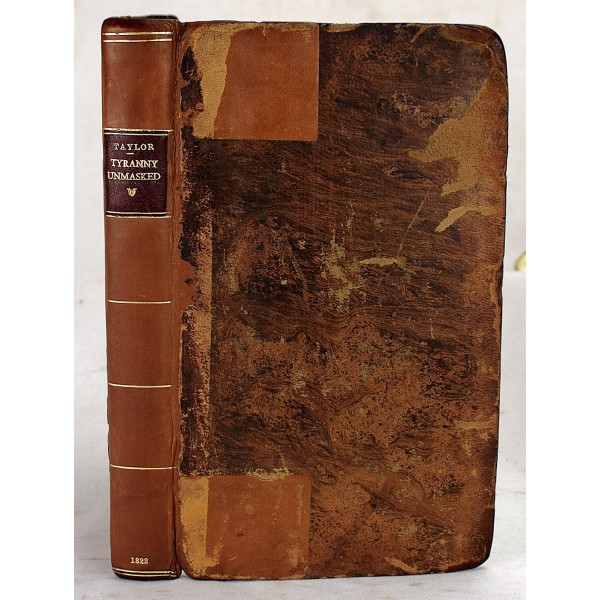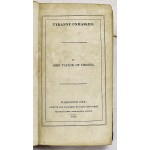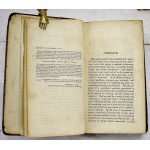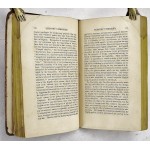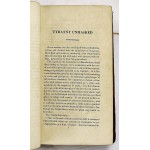Tyranny Unmasked
Tyranny Unmasked
John Taylor Of Virginia
Washington City : Davis and Force, 1822
First edition. Rebacked modern spine over contemporary sheepskin boards. Light water stain at top outer corner. Edges dyed yellow. 349 pages. Refs: Sabin 94495. Howes T65. Cohen 6334.
Contents: Section 1. Unmasking the protecting-tariff policy and its advocates from many perspectives; section 2. Arguments against the protecting duty summarized through an analysis of its major consequences; section 3. A general discussion of tyranny and the choice that Americans face.
John Taylor wrote "Tyranny Unmasked" not only to assault the protective tariff and the mercantilist policies of the times but also "to examine general principles in relation to commerce, political economy, and a free government."
Taylor is considered one of the premier early systematic theorists of states' rights. In this book Taylor develops his theory of the U.S. Constitution and discusses its effect on social policies, particularly taxation, banking, and tariffs; he also treats mainly protectionism, with a good deal of discussion on the currency as well. "Little-known today, Taylor's work is of great significance in the political and intellectual history of the South and is essential for understanding the constitutional theories that Southerners asserted to justify secession in 1861. He joined with Thomas Jefferson and other agrarian advocates of states' rights and a strict construction of the Constitution in the political battles of the 1790s. His first published writings argued against Secretary of the Treasury Alexander Hamilton's financial program. Construction Construed and Constitutions Vindicated was Taylor's response to a series of post-War of 1812 developments including John Marshall's Supreme Court decision in McCulloch v. Maryland, the widespread issuance of paper money by banks, proposals for a protective tariff, and the attempt to bar slavery from Missouri. Along with many other Southerners, Taylor feared that these and other measures following in the train of Hamilton's financial system, were undermining the foundations of American republicanism. He saw them as the attempt of an "artificial capitalist sect" to corrupt the virtue of the American people and upset the proper constitutional balance between state and federal authority in favor of a centralized national government. Taylor wrote, "If the means to which the government of the union may resort for executing the power confided to it, are unlimited, it may easily select such as will impair or destroy the powers confided to the state governments." Jefferson, who noted that "Col. Taylor and myself have rarely, if ever, differed in any political principle of importance," considered Construction Construed and Constitutions Vindicated "the most logical retraction of our governments to the original and true principles of the Constitution creating them, which has appeared since the adoption of the instrument." Later Southern thinkers, notably John C. Calhoun, were clearly indebted to Taylor." - Reprints of Legal Classics.
